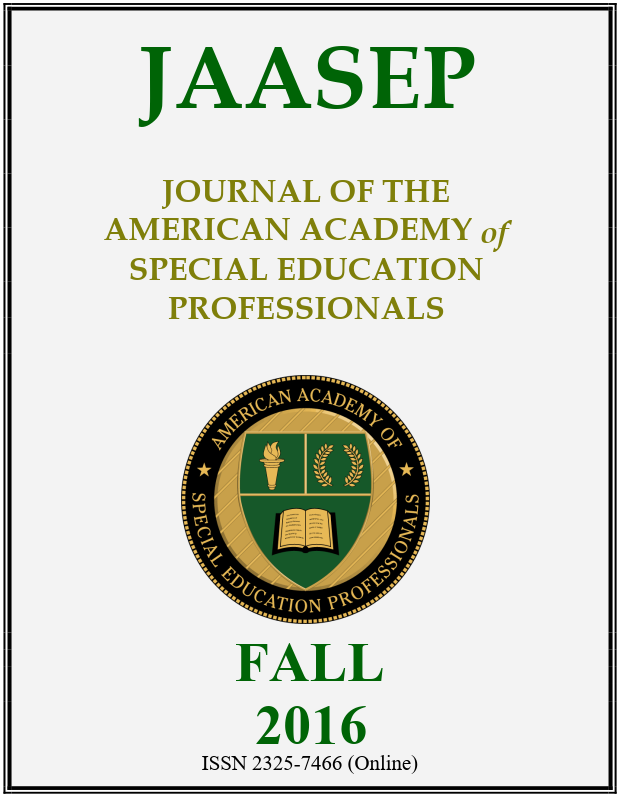Leadership Style of Head Teachers of Basic Special Schools as Correlates of Retention of Special Needs Educators in Southern Ghana
Adeyemi, T.O. (2011). Principals’ leadership styles and teachers’ job performance in senior secondary schools in Ondo State, Nigeria. Current Research Journal of Economic Theory. 3 (3), 84 – 92.
Aghenta, J.A., (2001). Educational planning: A turning point in education and development in Nigeria. Inaugural Lecture Series 58 University of Benin, Benin-City, Nigeria. Appiah-Agyekum, N. N., Suapim, R. H., & Peprah, S. O. (2013). Determinants of job satisfaction among Ghananian Teachers. Journal of Education and Practice, 4 (3), 43-50.
Avoke ,M., Offer-Nyadu, Y. & Mensah ,A.K. (1999). Are teachers leaving special education? Ghanian journal of special Education 1(4): 21-26.
Bhatti, N., Maitlo, G. M., Shaikh, N., Hashmi, M.A. & Shaikh, F. M. (2012). The impact of Autocratic and Democratic Leadership Style on Job Satisfaction. International Business Research, 5 (2).192-201. DOI: https://doi.org/10.5539/ibr.v5n2p192
Boateng, C. A. (2001). Teacher job satisfaction as a major factor in teacher retention: A survey of teachers views in the Accra metropolitan district. Unpublished long essay presented to the Department of psychology and Education, University of Education, Winneba. Bogler, R. (2001). The influence of leadership style on teacher job satisfaction. Educational Administration Quarterly, 37(5), 662-683. DOI: https://doi.org/10.1177/00131610121969460
Bogler, R. (2005). The satisfaction of Jewish and Arab teachers in Israel. Journal of Social Psychology, 145(1), 19-33. DOI: https://doi.org/10.3200/SOCP.145.1.19-34
Chambers, C. (2008). Special education’s challenges: Isolation and lack of administrative support can challenge special education teachers. Available on the internet: http://www.districtadministration .com/view article pf.aspx? article 15-18.
Cobbold, C.(2010). Teacher retention in Ghana: Perceptions of Policy and Practice. Lambert Academic Publishing. Cole, G.A.( 2002). The administrative theory and workers’ motivation. ABU Zaria, Nigeria Zante institute of administration Press Ltd.
Creswell, J. W. (2005). Educational Research: Planning, Conducting, and Evaluating Quantitative and Qualitative Research. New Jersey: Pearson Prentice Hall.
Duesbery, L. & Werblow, J. (2008). How to retain special education teachers. Keeping Special education on the job is essential if schools are to close the achievement gap for students with disabilities. National Association of Elementary Principals, 1-3.
Ingersoll, R. (2001). Teacher turnover and teacher shortages: An organizational analysis. American Educational Research Journal, 38 (3), 499-534. DOI: https://doi.org/10.3102/00028312038003499
Lankford, M., Loeb, S. & Wyckoff, J. (2002). Teacher sorting and the plight of urban schools. A descriptive analysis. Educational Evaluation and Policy Analysis, 24(1), 37–62. DOI: https://doi.org/10.3102/01623737024001037
Mba, J. (2004). Strategic Management Centre. Printed and Published by Punch (Nig.) Ltd. 1 Olu Aboderin Onipetesi. Ikeja, Lagos, 11 Dec., 2004, pp: A 24.
Ngururi, M. J. P. (2013). Influence of teachers’ job satisfaction on pupils’ performance in Kenya certificate of primary education examinations in Gilgil district of Nakuru County, Kenya. Unpublished Masters’ dissertation presented to University of Nairobi, Kenya.
Northouse, P. G. 2010. Leadership, theory and practice (5th ed.). Sage, Thousand Oaks, CA. Nsubuga,Y. K. K. (2008). Analysis of Leadership Styles and School Performance of Secondary Schools in Uganda. Doctoral Dissertation presented to Faculty of Education, Nelson Mandela Metropolitan University.
Nyanjom, C.R. (2013). Factors Influencing Employee Retention in the state Corporations in Kenya. Masters thesis submitted to University of Nairobi. Kwarteng, E.K.(2012,October 1).Untrained teachers to be absorbed. Daily Graphic. (Accra) (No.148939)p.1.
Omeke, F .C . & Onah, K. A. (2012). The influence of Principals’ Leadership Styles on Secondary School Teachers’ Job Satisfaction. Journal of Educational and Social Research, 2 (9), 45-52.
Oyetunyi, C .O. (2006). The relationship between leadership style and school climate: Botswana secondary schools. Unpublished Doctoral thesis. University of South Africa.
Saani, A. J. (2013). Influence of compensation and supervision on private basic school teachers work performance in Ashiaman municipality. Turkish Journal of Teacher Educational, 2 (2),22-37.
Sam, F. K., Effah, B. & Osei-Owusu, B. (2014). Exploring issues of teacher retention and attrition in Ghana: a case study of public senior high schools in Kwabre East District of Ashanti region – Ghana , Journal of Education and Practice 5 (1), 83-89.
Sigilai R. M & Bett D.C (2013). Effectiveness of head teachers’ leadership style on the management of Public Primary School Curriculum Implementations in Bomet County, Kenya. Journal of Emerging Trends in Educational Research and Policy Studies, 4(2), 375 – 382).
Thornton, R., Peltier, G. & Medina, R. (2007). Reducing the Special Education Teacher Shortages. Heldref Publisher. DOI: https://doi.org/10.3200/TCHS.80.5.233-238
Voon, M.L., Lo, M.C., Ngui, K.S., & Ayob, N.B. (2011). The influence of leadership styles on employees’ job satisfaction in public sector organizations in Malaria. International Journal of Business Management and Social Sciences. 2 (1), 24 – 32.
